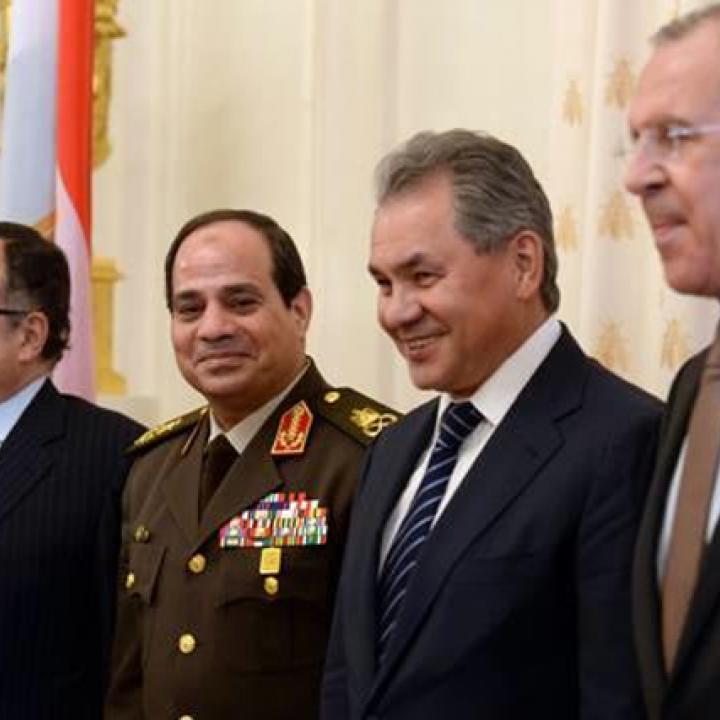

The Russian-Egyptian "2+2" meeting in Moscow does not signify a foreign policy realignment in Cairo.
Although Field Marshal Abdul Fatah al-Sisi and Foreign Minister Nabil Fahmy's trip to Moscow is significant, there is no foreign partner that can replace Washington. Amid rapid political developments on the ground, the decades-long U.S. investment in the Egyptian military has served as the anchor of the bilateral relationship in the past few turbulent months. Defense Secretary Chuck Hagel has called Sisi more than twenty times during this period, with some calls lasting more than an hour. More broadly, Washington and Cairo's mutual strategic security interests remain the central pillar in their relations.
Yet the holdup in U.S. military aid shipments in October -- while the Egyptian military was fighting major terrorist cells in the Sinai and tackling serious border security threats -- led to the current rapprochement with Moscow. Soon after President Obama's decision, the head of Russian military intelligence visited Cairo, followed in November by an unprecedented "2+2" visit by the Russian foreign and defense ministers. The bilateral discussions involved a tentative $2 billion arms sale to the Egyptians, funded by Saudi Arabia and the United Arab Emirates. That deal was not formally signed during this week's trip, but it could be finalized during the next meeting in Moscow, scheduled for March 28.
Since former president Muhammad Morsi's June 30 ouster, the White House has been reluctant to fully support Egypt's political trajectory and has mainly been concerned about linking the Muslim Brotherhood's status to the country's prospects of stability. The inconsistent U.S. policy toward Egypt has made Cairo open to offers of weapons sales from other countries, and Russia was quick to seize the opportunity for commercial and geostrategic reasons. Yet Egypt's move should not be interpreted as a step toward abandoning Washington. On the contrary, U.S.-Egyptian relations remain of vital strategic importance, and military cooperation remains strong. At the same time, however, Washington's suspension of military aid pushed Egypt to seek weapons elsewhere in order to secure its basic national security interests. Unlike the Obama administration, the Egyptian government believes that the country's ongoing instability stems not from the domestic political situation, but rather from embedded terrorist cells in Sinai and various border security threats, such as weapons smuggling from Libya, Sudan, and Gaza.
To be sure, monitoring the outcome of the Egyptian-Russian arms deal is of critical importance. Yet even as Sisi and Fahmy visit Moscow, Egypt's U.S.-educated military leadership is eager to maintain the strategic relationship with Washington. The test for the Obama administration is to be nimble enough to sustain a robust and mutually beneficial security relationship, including the provision of substantial military aid, while also maintaining America's commitment to human rights and unfettered participation in political life by peaceful, legitimate actors. For example, the Moscow trip has been overshadowed in Western mainstream media by the three-week-old arrest of an Egyptian citizen who worked at the U.S. embassy and was responsible for setting up meetings between U.S. and Brotherhood officials. Some have alleged that he was participating in a Brotherhood demonstration when he was detained, but there is still no official information about the reason behind the arrest.
Given Cairo's mistakes during and since Hosni Mubarak's presidency, balancing security relations and human-rights concerns will remain an uphill battle if Sisi becomes president as expected. Yet it is by no means an impossible task.
Adel El-Adawy is a Next Generation Fellow at The Washington Institute.



